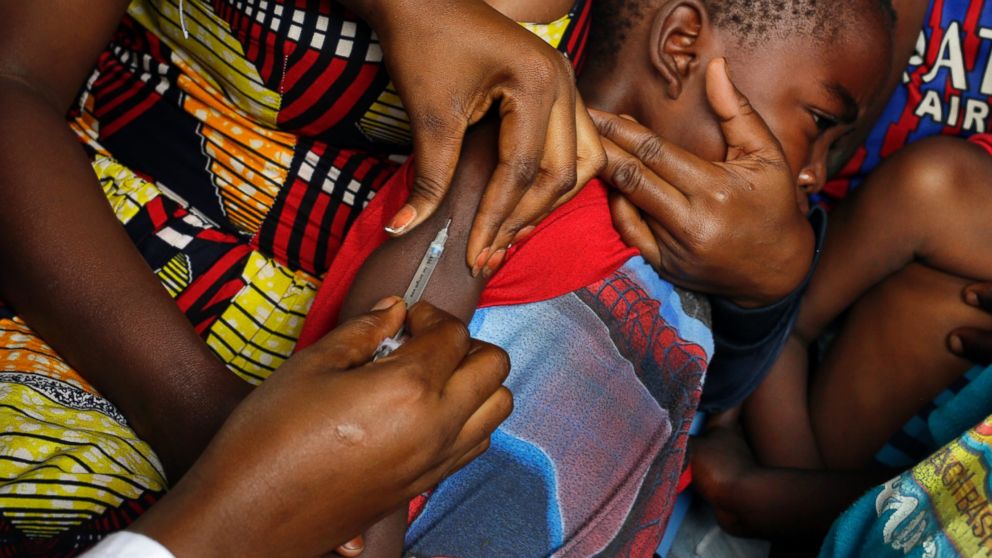Limited Vaccine to Prevent the Spread of 'Explosive' Yellow Fever Outbreak
The vaccine shortage has experts concerned the outbreak could spread globally.

— -- An "explosive" outbreak of yellow fever has left officials struggling access to enough of the vaccine to protect millions who may need it. With the shortage, some experts are concerned the virus could spread past Africa, creating an urgent need for more protection.
This week, the World Health Organization (WHO) pledged to vaccinate 14 million people against the disease in 8,000 locations by diluting the vaccine to one-fifth the dose -- a stop-gap measure aimed at providing at least some protection, since the vaccine is in limited supply and takes six months to develop.
"Protecting as many people as possible is at the heart of this strategy," William Perea, Coordinator for the Control of Epidemic Diseases Unit at WHO said in a statement on Tuesday. "With a limited supply we need to use these vaccines very carefully."
The current vaccination plan has public health officials concerned they won't be able to protect enough people to prevent the spread of the virus, raising alarm the virus could reach densely populated regions in Asia, where it could spread rapidly or become endemic.
The yellow fever outbreak started in December of last year has caused 5,000 infections and at least 400 deaths in Angola and the Democratic Republic of Congo. The disease is spread by mosquitoes, especially the Aedes aegypti mosquito that also spreads Zika virus.
Symptoms of yellow fever include fever, chills, severe headache, back pain and nausea; the virus has been fatal in approximately 20 percent of cases. The WHO and their partners have already vaccinated 16 million with a full dose of yellow fever vaccine that provides coverage for life. But as supplies have dwindled, they are implementing an emergency measure, diluting the vaccine further so that it will provide protection for one year.
Yellow fever "transmission in 2016 has been explosive and rapidly exhausted the usual global emergency stockpile of 6 million vaccine doses," according to WHO officials in an August 6 statement.
Many public health experts are anxiously watching the yellow fever outbreak and are concerned it could spread to countries that have never faced large scale outbreaks of this virus before and therefore have little natural immunity, Dr. William Schaffner, an infectious disease expert at Vanderbilt University Medical Center told ABC News. He described it as "an ominous little black cloud hanging over all of this."
"Yellow fever has never been [widely] introduced into Asia," he added. "The possibility exists that someone could travel to infected country and has virus in their system and start epidemic in part of the world heretofore unaffected."
The WHO said they have a stockpile of 5 million emergency doses of the vaccine currently, but a second outbreak in a densely populated country could deplete the dangerously low vaccine supply.
Public health officials have to fight the virus on two fronts, Schaffner said, both by treating people and reducing mosquito populations so it doesn't spread. He said an outbreak must be stopped early to prevent it spreading across the globe.
Following the Ebola outbreak that infected more than 28,000 and left 11,000 dead in the past year, a report from the U.S. Centers of Disease Control and Prevention (CDC) warned that outbreaks can no longer be easily contained by geography.
"This epidemic in the three countries and its introduction to seven other countries illustrates how all countries are connected and that a threat in one country is a threat everywhere," CDC researchers said in the June report.
Yellow fever is "tenacious" and the number of cases in Africa is probably far higher than what had been reported, Dr. Stephen Morse, an epidemiologist at the Columbia University Mailman School of Public Health told ABC News.
"Even if it isn’t a pandemic danger it could have effects. It is a globalized world and we all affect each other," he said. "It may come here in a small way like Ebola or a big way."
Morse said since the vaccine supply is limited it could be a struggle to contain a larger outbreak and that attempts to reduce the mosquito population is difficult.